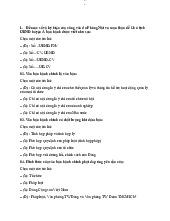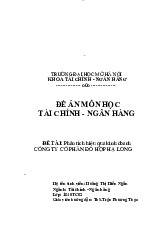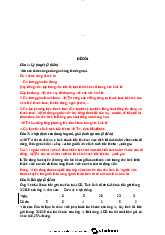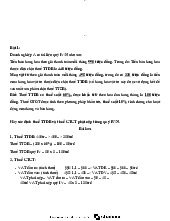












Preview text:
lOMoARcPSD|45315597 lOMoARcPSD|45315597 Unit 2. Clauses
Exercise 1. Indicate, by Od, Oi, Cs or Co whether the parts underlined in the sentences
below are the direct object (Od), the indirect object (Oi), the subject complement (Cs) or the object complement (Co):
1. Will someone get a doctor, quickly! Od
2. George and Paul both became famous doctors. Cs
3. Do you call yourself a doctor?Od/Co 4. May I call you Jenny? Od/Co
5. May I call you a taxi or something? Oi/Od
6. Call me anything you like. Od
7. It’s so cold. I can’t get warm. Cs/Cs
8. I can’t get my hands warm. Od/ Co
9. Keep quiet. Keep those children quiet.Cs/Od/Co
10. Can’t you give them something to keep them quiet.Oi/Od/Od
11. The young man was slowly going mad.Cs
12. His mother-in-law was driving him mad. Od/Co
13. The driver turned the corner too quickly.Od
14. The weather is turning warmer.Cs
15. The hot weather turned all the milk sour.Od/Co
16. The young man grew very depressed.Cs
17. He grew his hair long.od/co
18. He had made a great mistake.Od
19. His in-laws had simply made him their servant.Od/Co
20. His wife sometimes made him curry.Oi/Od
21. But this only made him more miserable. Od/Co
22. Show me your passport. Show me.Oi/Od/Oi
23. Did you see anyone? Did you say anything? OD/Od
24. I didn’t tell anybody anything.Oi/Od 1 lOMoARcPSD|45315597
Exercise 2. Divide each of the sentences below into its constituent parts, and label each part
S, V, C, O or A as in models A and B.
A Computers/are/fairly commonplace/today. S V C A B /Did/you/ever/eat/chicken? V-SA-VO
1.Full-scale computers/ have/ a large number of program. S V O
2. We must change all the programs tomorrow. S V O A
3. Tomorrow will be a holiday here. S V Cs
4. These bookshelves are becoming very popular in Sweden. S V Cs A
5. We have recently added an extra unit to them. S V O A 6. Will you give it a try? V S V Oi od
7. On July 7, DDT was sprayed on the marsh from a helicopter.
ASVCA 8. We all read too many books too quickly. S V O A
9. The young man grew restless in his mother-in-law’s house. S V C A
10. They had made him their son-in-law despite his objections. S V OD Co A
11. He found his mother-in-law greedy. S V O C 2 lOMoARcPSD|45315597
12. They had found him a charming young wife. SVOIOD
Exercise 3. Isolate and label the dependent clause or clauses in each of the sentences below,
as in the following two models, a I think you can do it
You can do it: finite clause acting as 0 in the superordinate clause.
b Leaving the room, he tripped over the mat.
Leaving the room: non-finite, -ing participle clause, acting as A in the superordinate clause,
using the symbols S (=subject), O (=object), C (=complement), A (=adjunct). 1. T
hat you could do it always knew. Finite- Od 2. T
hat you can do it is still uncertain. Finite - S
3. You can do it if you try. Finite -A of condition
4. I f you can do it , I’ll give you ten dollars. finite - A 5. S
tanding here all day , I see many strange faces. Non-finite/ ing participle clause-A 6. S
tanding here all day is extremely tiring. Non - finite/ ing participle clause- S
7. My greatest pleasure is to listen to chamber music. Non finite/ to infinitive clause- Cs 8. T
o listen to chamber music is my greatest pleasure. Non finite/ to infinitive clause- S 9. E
xhausted after the long journey , I fell asleep at once. Non- finite/ ed- participle clause- A 10. T
he long journey over , we relaxed in the warm sunshine. verbless clause- A TIME 11. Gla
ncing up at my tired face , she asked, in a rather grating voice, how I was feeling.
Non - finite/ ing participle clause- Atime Od
12. Steinweg had a large room where we always breakfasted together. postmodifier
13. He was a delightful companion, always cheerful and considerate.Non- finite/verbless- A
14. She had not asked life to be thus.
15. She sang when allowed to do so. Non- finite/ ed- participle/ Atime 3 lOMoARcPSD|45315597
16. She sang completely out of tune, so that permission was seldom granted.finite/ Aresult 17. W
hat he saw both surprised and frightened him. Finite/S 18. S
ince I have been especially invited to speak , for you now to tell me I cannot do so is Finite clause-Areason
to infinitive non-finite clause- S finite clause- O quite unpardonable. 19. Ha
ving been invited to speak , and then being told to keep silent, I shall never come
here again as long as I live. Non-finite/ ing participle clause-Acause A time
20. What I wanted to say was, a s I didn’t know whether you were going to say that you could S Atime know-Od say-Od
come or you couldn’t, could you make it the following Saturday?
Exercise 4. Classify the function of the dependent clauses in the sentences below under the following headings: a subject g adjunct b direct object h disjunct c subject complement i conjunct d indirect object j postmodifier in noun phrase e object complement k prepositional complement f appositive l adjectival complement 1. As
the sun went down behind the church , the trees suddenly became still. G
2. I was terrified, to tell you the truth. H
3. One afternoon I was sitting on the wall dividing our house from the churchyard. J
4. In daylight, I thought of the Roman remains that had been dug up under our house.J 5. W
alking along from St Mary’s , you come to a high wall. G 4 lOMoARcPSD|45315597
6. You find the wall heightens suddenly.B
7. We found the wall overgrown with ivy.E 8. W
hat I remember most of that evening is the reasonableness of my father’s arguments.A
9. The truth is that I really liked him. C
10. The truth, that I really wanted to learn, suddenly dawned on my poor father.F 11. W
hat is more important , I suddenly felt ashamed of my childishness. I
12. My father was sure that I would overcome my fears. L
13. He strongly disapproved of what I had been doing.K
14. Now I often meet men who were once at school with me.J 15. W
henever I encounter one of them , I feel an outside. G
16. However, seeing George again has left me much more confident.A
Exercise 5. If to talk in He likes to talk is a non-finite infinitive clause, without a subject
acting as object of likes, give a corresponding explanation of the italicized parts of the following sentences: a We wanted to go home.
d I heard them-Od leave-Co. b We enjoyed walking.Od e I saw them waiting.
c I expected you to be here.
f I found my seat occupied.
a. non-finite, to inf. clause, without subj., Od;
b. non-finite -ing cl., without subj., Od;
c. non-finite/ to inf. clause, subj, O
d. non-finite, bare inf. cl., subj. they, obj. of
heard; e. non-finite, -ing clause, subj. they, obj f
non-finite -ed cl., subj, obj. occupied. Nominal clauses
Exercise 6. Combine each of the pairs of sentences below so as to form one sentence
containing a nominal that-clause. Say in each case whether the subordinator that is optional
or obligatory; and say what function the that-clause is fulfilling in the superordinate clause:
1. We have only enough water for two days. I told you so.
I told you we had …/ optional/Od 5 lOMoARcPSD|45315597
2. We have only enough for two days. I am very
sorry. I am very sorry we have …/ optional/C
3. We have only enough for two days. That is our conclusion.
our conclusion is we have only…/ optional/Cs
4. In view of the drought, there is only enough water for two days. That is our conclusion.
our conclusion is that, in view of the drought, there is only enough water for two days/ obligatory
5. We have only enough for two days. I estimate that having taken very careful measurements.
I estimate that we have only enough for two days having taken very careful measurements. optional
6. We have only enough for two days. That is very alarming. it
is very alarrming that we have only …/ obligatory/Apre
7. We conclude that there is only enough for two days. Our conclusion has been reached after very careful checking.
Our conclusion, reached after careful checking, is that there is only enough for two days; that oblig.; that-clause Cs
8. We cannot stay here. We must face that fact.
We must face the fact that we can’t stay here/ oblig/O
9. I am convinced we cannot stay here. The results will be disastrous if we
do. 9. I am convinced that we cannot ... and that the results ... ; / oblig/Co
10. We have almost exhausted our supplies. How can I convince you of that?
How can I convince you that we have almost ... ;/ oblig/Od
Exercise 8. Combine each of the pairs of sentences below so as to form one sentence
containing a wh-clause. Say what function the wh-clause is fulfilling in the superordinate clause:
1. What caused the explosion? No one ever discovered. 6 lOMoARcPSD|45315597
No one ever discovered what caused the explosion. O
2. What damage did the explosion cause? It took three weeks to estimate.
It took three weeks to estimate what damage the explosion caused, O.
3.Where did the fire start? That was a complete mystery.
Where the fire started was a complete mystery. S.
4. When did the fever begin? The seriousness of his condition depends on that.
The seriousness of his condition depends on when the fever began, C of preposition
5. When did the fever begin? I am not quite sure. I
am not quite sure when the fever began, C of adj
6. Which drawer does he keep his money in? I can never remember.
I can never remember which drawer he keeps ... , O
7. How can we reduce this high temperature? My problem is that.
7. My problem is how we can reduce ... , Cs
8. Why didn’t he say he was feeling ill? The question is irrelevant at his stage.
The question why he didn't say ... is irrelevant ... ,/ in apposition to S
9. How often do these fevers occur? I cannot tell you that precisely.
I cannot tell you precisely how often these fevers occur, Od
10. How much will all this cost? I am concerned about that. I
am concerned about how much all this will cost, Cprep.
Exercise 9. Replace the finite wh-clause by an infinitive wh-clause whenever possible. Then
give a full and accurate statement of the restrictions on the formation of an infinitive wh- clause:
1. I never know where I ought to put my coat.
I never know where to put my coat.
2. Where I ought to put my coat! Never know.
Where to put my coat! Never know
3. I can’t tell you where you can put your coat. 7 lOMoARcPSD|45315597
I can’t tell you where to put your coat
4. Can you tell me where the guests can put their coats? ko đổi
5. I can’t remember where I put my coat yesterday. Ko đổi
6. Can anyone tell me what I must to do? Can anyone tell me what to do?
7. Does anyone know how one can open this safe?
Does anyone know how to open this safe?
8. Someone will tell us when we should start.
Someone will tell us when to start
9. Someone will tell us when the concert will end. Ko đổi
10. Will somebody tell me why I must fill up this form? Ko đổi
Exercise 9. Combine each of the pairs of questions below so as to form one question
containing a dependent yes-no clause. When both if and whether would be acceptable, say so:
1. Are you really enjoying yourself? I
wonder. I wonder whether you were really…
2. Are you really enjoying yourself? He asked me.
He asked me whether I was really enjoyed myself
3. Are you enjoying yourself or not? I don’t
care. I don't care whether you are ... or not.
4. Does it cost too much? That depends on how badly you want
it. Whether it costs too much (or not) depends on how badly ...
5. Does it cost too much? My decision will depend on that.
My decision will depend on whether it costs too much.
6. Is it too expensive or not? That is the crucial question.
Whether it is too expensive or not is the crucial question 8 lOMoARcPSD|45315597
7. Can it be easily resold? I’m not interested.
I'm not interested in whether it can be ...
8. Is it properly insured? I am not
sure. I am not sure if/whether it is ...
Exercise 10. Rephrase these sentences, using an –ing participle preceded by a personal
pronoun or noun in the genitive case:
1. We all are surprised that he made that mistake.
2. He was an astronaut and that accounted for the size of the audience.
3. No one will object if you finish the lecture a little early.
4. Would you approve if I had this article copied?
5. We did not realize that Walker would cause so much trouble by speaking to the press.
6. The fact that he has spoken to the press about this has caused us a good deal of embarrassment.
7. Do you mind if I don’t come with you?
8. We had not been told of the meeting till yesterday and that meant that we did not have
sufficient time to prepare our case properly.
Exercise 11. Say (a) what function the infinitive clause fulfils in the superordinate clause
below; and (b) what is the subject of each of the two clauses:
1. I expect to be there this evening.
2. I expect everyone to be punctual this evening.
3. I promise you not to be late.
4. The plan is for us all to meet outside at eight.
5. The plan for us all to meet outside was absurd.
6. To speak in public for the first time can be a terrifying experience.
7. For Osbert to appear in public at such a time was rather courageous.
Nominal –ing clauses
Exercise 12. Say what function the –ing clauses in the superordinate clauses below:
1. I always enjoy listening to chamber music.
2. Listening to chamber music is my greatest pleasure. 9 lOMoARcPSD|45315597
3. His greatest pleasure, climbing mountains, had to be abandoned.
4. Was he, then, so given to climbing mountains?
5. He was always happy scaling almost perpendicular cliffs. Comment clauses
Exercise 13. If the underlined part of each of the following sentences constitutes a comment
clause, answer Yes and then explain in what way the clause functions:
1. I told you Burke was an eloquent speaker.
2. Burke was an eloquent speaker, I told you.
3. Burke, I told you, was an eloquent speaker.
4. His audience listened spellbound as he spoke.
5. His audience listened spellbound, as I said.
6. What some of them were thinking, I can well imagine.
7. What were they really thinking, I wonder?
8. Burke endeavoured, in all his speeches, to be sincere.
9. Sometimes, to be sincere, I felt that his eloquent concealed the real truth. 10. W
hat is important , he believed passionately in the cause ha was upholding.
11. What is important for him was this passionate belief. 12. S
peaking as a patriot , he succeeded in arousing patriotic feelings in the most self-
seeking members of his audience. 13. S
peaking as a patriot is always a popular course when one’s country is threatened. 14. S
peaking as a patriot , I feel that he is playing a dangerous game. 15. S
ummed up in words of one syllable , he is a fool. 16. S
ummed up in simple language , his speech meant nothing at all. 17. You
may remember you told me about your trip to Vienna.
18. You told me about your trip to Vienna, you may remember.
19. You told me, you may remember, that you saw Frances there.
20. I remember , you told me she was travelling with her cousin.
21. Was it really her cousin, I wonder?
Comparative clauses 10 lOMoARcPSD|45315597
Exercise 14. Indicate, by S, Cs, Od, Oi or A, the comparative element in the following sentences:
1. Man has greater power over his environment than he has ever had before.
2. More has been discovered about the universe in the last fifty years than in all the previous centuries.
3. Technology has given more people than ever the means of leading a comfortable and easy life.
4. Science has progressed more rapidly in the last few decades than in hundreds of years before.
5. Yet are we really happier than our ancestors were?
Adverbial clauses
Exercise 15. Reduce the finite time clauses to non-finite or verbless time clauses whenever
such reduction would be acceptable without change of voice.
1. When I last saw you, you lived in Washington.
2. When you lived in Washington, did you ever meet Robert H. Davidson?
3. Since I met you, I have been reading your book.
4. Once your book is published, it will sell very rapidly.
5. When you are in Rome, do as Rome does.
6. Until you are asked to speak, you would be well advised to remain silent.
7. Before he served in the army, he was much too fast.
8. While he was in the army, he learnt a great deal about electricity.
9. When you enter the town, you will see the monument straight in front of you.
10. After he had travelled round the world. Forbes settled down peacefully in his native village. 11 12
Downloaded by H?u mai (maihauhaumai@gmail.com)



